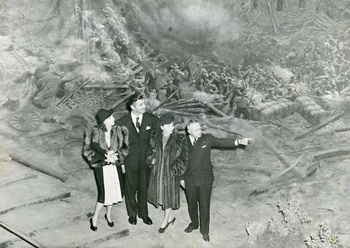Thomas Bellinck is a member of the Steigeisen company (Fobbit, Lethal Inc.) In 2013 he created the futuristic-historical EU “museum” Domo de Europa Historio en Ekzilo. For Memento Park he has drawn on archive material and interviews with people involved in the organisation of commemorations. The result is a show with many voices. “To a considerable extent, the show grew out of a fascination with what moves us to commemorate things – such as the Great War, right now,” says Bellinck. “What are we commemorating and how do we commemorate? What is our connection with the past? We began our research at a general level and finally found ourselves looking into the social and political mechanisms brought into play in a state-organised commemoration, in which a number of rituals and symbols are involved. These days, you don’t see the kind of classic nationalist commemoration that was current a hundred years ago. But you can still see a number of threads of continuity. The US historian Jay Winter says that a commemoration always involves four things: form, ritual, business, and politics. That makes sense to me. A commemoration is never neutral. It is about history and how we rewrite it. It always means selection and interpretation.”
Here, the Flemish regional government has been particularly prominent in the Great War commemorations.
Thomas Bellinck: There is also a Belgian, federal commemoration, but that has been kind of overshadowed by the Flemish government’s commemoration, on which they have been working since 2008. Most projects, of course, have a local input, but strangely enough the Flemish government decided to organise the entire commemoration under the umbrella of its tourism department, rather than in the context of culture or education. Just recently, the Flemish government has quietly withdrawn the famous “Flanders Fields Declaration” – a sort of peace declaration that was to be signed by fifty countries. Lots of countries were uncomfortable with the fact that the initiative came from a region and also with a slogan such as “War: never again!” in the present international context.
Thomas Bellinck: welcome to Memento Park

The current avalanche of World War One commemorations has stimulated the playwright and director Thomas Bellinck to look into the history of public commemoration. That resulted in Memento Park.
That tourism emphasis is reflected in your title, Memento Park.
Bellinck: No matter how thoughtfully the commemoration may be organised, tourism is an economic sector and that also has consequences for the jargon used. The name Memento Park is not something we dreamt up ourselves: at one point, the Flemish government sought to draw attention to the Flemish commemorative landscape via an agency whose project proposal used the term “commemorative park”. On the day after the Battle of Waterloo, by the way, there was already a British tourist on the battlefield: he happened to be in Brussels and went down to have a look. These days, you also have immersion trips to places like Palestine. Again and again, heartfelt humanitarian interest and genuine human anxiety about injustice are mixed with a spirit of adventure, commercial reflexes, and political motives.
MEMENTO PARK • 6, 7, 11 > 14/2, 20.00, €17/20, NL & EN (surtitré en FR), KVS_BOL, Lakensestraat 146 rue de Laeken, Brussel/Bruxelles, 02-210.11.12, www.kvs.be
Bellinck: No matter how thoughtfully the commemoration may be organised, tourism is an economic sector and that also has consequences for the jargon used. The name Memento Park is not something we dreamt up ourselves: at one point, the Flemish government sought to draw attention to the Flemish commemorative landscape via an agency whose project proposal used the term “commemorative park”. On the day after the Battle of Waterloo, by the way, there was already a British tourist on the battlefield: he happened to be in Brussels and went down to have a look. These days, you also have immersion trips to places like Palestine. Again and again, heartfelt humanitarian interest and genuine human anxiety about injustice are mixed with a spirit of adventure, commercial reflexes, and political motives.
MEMENTO PARK • 6, 7, 11 > 14/2, 20.00, €17/20, NL & EN (surtitré en FR), KVS_BOL, Lakensestraat 146 rue de Laeken, Brussel/Bruxelles, 02-210.11.12, www.kvs.be
Photo: Gone with the Wind cast members Vivien Leigh, Clark Gable and Olivia Dehaviland touring the Atlanta Cyclorama with George Simons from the Atlanta City Parks department on 16 December 1939 - Georgia State University Library
Read more about: Podium
Fijn dat je wil reageren. Wie reageert, gaat akkoord met onze huisregels. Hoe reageren via Disqus? Een woordje uitleg.